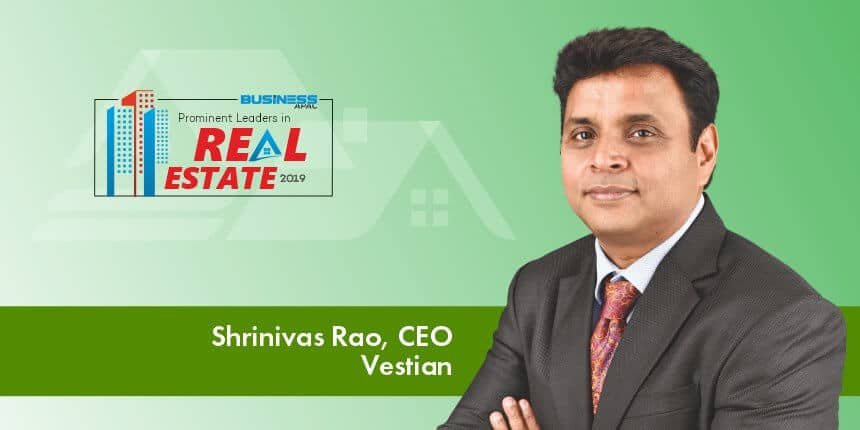The real estate industry has evolved by leaps and bounds in the past few years. It needs leaders who can anticipate change and rise to the occasion, to deliver stellar client experiences. One such leader is Shrinivas Rao, the CEO of Vestian. A veteran of the real estate industry, Shrini was one of the first professionals to join the real estate services industry in India and has been a huge part of shaping the current workplace solutions environment, as we know it today.
His expertise lies in not just identifying requirements, innovations, and improvements needed in the sector, but also looking beyond the traditional business models to explore and shape the future of the organised workplace. He believes one is never too old to learn and is passionate about keeping himself abreast of the latest- so much so that he has recently gone back to school at Yale, to get more insights on business and strategic thinking.
At Vestian, Shrini and his team are striving to bridge the gap between people, industry trends, and technology. In an interview with Business APAC, he explains his journey with the company and how he handles the challenges in this dynamic real estate market. Here are some excerpts.
Bridging the gap
Please walk us through your professional journey and why have you chosen this industry?
I started my career with one of the oldest architectural firms in India, Chitale & Sons, where I worked on multiple projects. This is where I realized that my passion lies in the real estate sector and I decided to pursue a career in this field. During the course of my early working years and on an ongoing basis, I closely observed the challenges that corporates faced while seeking workplace solutions. The entire industry was unstructured and fragmented and not a single firm could provide integrated workplace solutions to corporates. I identified this limitation and played an active role when organized real estate teams started to foray into India, to capitalize on the immense potential and went on to become a key contributor in establishing professional commercial real estate services in India. I was involved in launching and establishing businesses of Colliers International and Cushman & Wakefield in South India and further went on to successfully establishing the Asia Pacific operations of UGL Equis.
At UGL Equis, I realised that there was a shift in focus from occupier solutions to a more landlord service delivery model. It was at this juncture I decided to start my own workplace solutions firm – Vestian. The core focus of Vestian was tenant representation. I saw the tenant representative model as a means to build, scale, provide conflict free solutions, and build trust amongst clients. I collaborated with Michael Silver, a pioneer in his own right, in the workplace industry and former owner of Equis, to create Vestian with the underlying philosophy of transparency and accountability. The new entity came into being in 2010 and was headquartered in Chicago.
Leading by Example
What are your key roles and responsibilities as the Founder/CEO of Vestian?
Like every business leader’s prerogative is to oversee the progress and development of his/her business, I am responsible for overseeing Vestian’s growth initiatives in the APAC region. Being a hands-on person, I get involved in every aspect of the business from recruitment to business development, project management and building the team. It is my utmost priority to ensure that the company achieves consistent revenue goals. At Vestian, we are committed to delivering client expectations as well as creating an accountable and transparent business environment for all our stakeholders.
Serving Customers Everywhere
Please enlighten us about your company and its present and future focus areas?
Vestian is a contemporary workplace solutions firm that specializes in providing occupier-focused solutions to corporate end-users across emerging markets. As the only tenant representation firm in India, we provide a transparent business environment for all stakeholders. The benefit can be gauged through the revenue saving in terms of operation cost of the organization. Vestian is also committed to creating a sustainable built environment. This can be seen in the fact that Vestian is certified by ISO for quality management, environmental health and safety, and anti-bribery management systems. Over the years, Vestian has brought the concept of client advocacy to the forefront, while introducing technology-driven solutions for better productivity.
Diversity & Cohesion
Please tell us about your company’s culture and team?
At Vestian, we strive for a diverse workforce. We believe that it is imperative to have strong team dynamics and cohesion to achieve success. Key factors such as strong employee contribution culture and loyalty help us attract and retain talent, challenge global names and increase our strategic competitiveness. I believe that the key to Vestian’s scalability and longevity lies in our people and their empowerment.
Besides, we believe in women empowerment. In fact, I have personally trained and groomed a team of highly qualified women to lead business verticals. It is my vision to build a company that has a good workforce diversity, embraces technology, and is able to raise the bar for the industry.
Focusing on Growth and Expansion
Enlist the key milestones you have set for Vestian for the next year?
Today, the company has completed assignments and projects across 90 locations in 5 countries including the U.S., U.A.E., India, Sri Lanka, and China. The company’s biggest strategic thrust now is to work on international growth and expansion to other parts of the world. We aim to double our revenue generation in the coming fiscal year by expanding our client base across geographies. We also intend to aggressively participate in industry CRE (commercial real estate) events and meets, to garner greater visibility and recall.
Industry Scenario
Tell us something about the current scenario of the real estate industry?
Over the past few years, the real estate industry in India has evolved by leaps and bounds. The government has introduced several acts that have weathered turbulent times and brought forth numerous landmark reforms. This includes the compliance-heavy Real Estate (Regulation and Development) Act, the Benami Transactions (Prohibition) Amended Act, and the unified tax regime–the Goods and Services Tax (GST) Act. Certain positive measures such as the announcement of liquidity support to NBFCs/HFCs by the Finance Ministry, cut in repo rate by the RBI, etc. have helped usher in new enthusiasm in the real estate industry which will probably pump in some quality revenue.
Real estate, in particular, is still seeing a steady growth in demand, right from the launch of the country’s first real estate investment trust (Embassy REIT) to a record high rate in office space leasing. I believe that this trend is expected to continue in the next five years. On the residential front, affordable and mid-segment housing sectors will continue to drive market growth. The residential market will be able to tackle the issue of unsold inventory owing to steady housing prices and lower interest rates.















